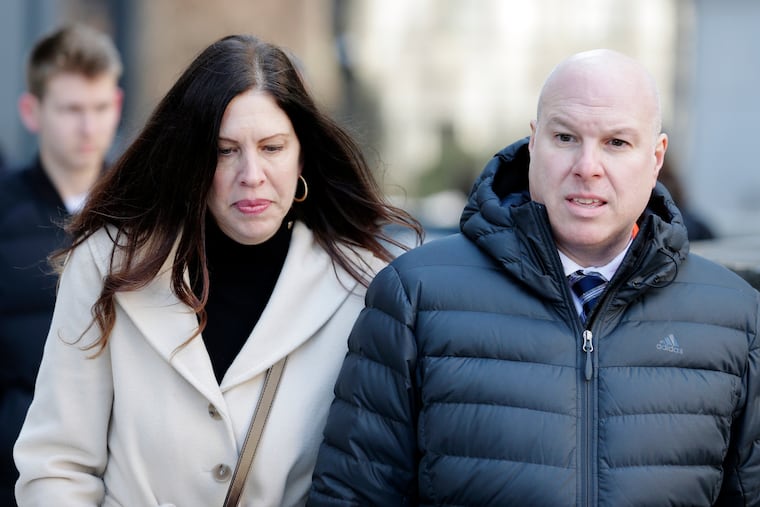Adidas officials, aspiring agent receive prison sentences in basketball corruption trial
A former Adidas executive was sentenced to nine months in prison and another Adidas official and an aspiring NBA agent each received six-month sentences for their parts in a pay-for-play scandal that rocked college basketball.

NEW YORK — A former Adidas executive was sentenced to nine months in prison Tuesday, while another Adidas official and an aspiring NBA agent each received six-month sentences for their parts in a pay-for-play scandal that rocked college basketball and offered a window into the black-market battles between rival shoe companies to steer top teenage basketball players to their flagship sponsored universities.
The men — Jim Gatto, a former basketball marketing executive at Adidas, Merl Code, a former Adidas basketball consultant, and Christian Dawkins, a former recruiter for an NBA agent — were found guilty last October of wire fraud and wire fraud conspiracy for brokering a deal to pay the father of one top recruit $150,000 if his son attended Louisville. Gatto also was convicted of fraud charges for arranging similar deals to steer recruits to Kansas and North Carolina State.
In delivering the sentences, which were less severe than what prosecutors sought but more than the probation terms requested by defense attorneys, Judge Lewis Kaplan explained he felt the need to send a "great big warning light to the basketball world," deterring others involved in similar payments. All three men were released pending their appeals, which could take years.
The three-week trial in October included evidence that suggested coaches at Louisville, Kansas and North Carolina State were all aware Adidas officials were providing some type of illicit recruiting help, and also included discussions between Adidas officials of rival bids for players by their counterparts at Nike and Under Armour.
The case resulted in an ignominious end to Rick Pitino's career as coach at Louisville. While he denied knowledge or involvement with the Adidas payments, Pitino was fired shortly after the charges were first announced in September 2017.
In arguing against prison terms, lawyers highlighted their clients’ clean criminal records — none of them had even been charged with a crime before — and the unusual nature of the case, which was based on a legal theory that, by paying the families of top recruits, the men defrauded the universities, which now face potential NCAA punishment as well as legal fees. Louisville, Kansas and North Carolina State all have asked for restitution payments from the men. Kaplan ordered restitution payments of $28,261 each for Code and Dawkins, while deferring a decision on restitution from Gatto to a hearing next month.
In explaining his sentence, Kaplan explained that he felt, regardless of the dispute over the complicated legal theories at play in the case, the men knew what they were doing was wrong, as demonstrated by masking the payments with fake invoices and secret cash handoffs in parking lots and hotel rooms.
Kaplan highlighted what he felt was the most memorable recorded phone call from the trial, in which Code and Dawkins discussed whether Pitino knew they had secured the commitment of recruit Brian "Tugs" Bowen to Louisville by agreeing to pay the boy's father $150,000, in installments, over the course of a year.
"He doesn't know everything," Code said on the wiretapped call. "Plausible deniability."
"They were covering their tracks, and they were covering Rick Pitino's tracks," Kaplan said. "Regardless of what Rick Pitino did or didn't know, the point is these men knew what they were doing was wrong, and they were covering it up."
In a statement, deputy U.S. Attorney Robert Khuzami praised the sentences.
"The sentences imposed today only begin to reflect the magnitude of the harm these defendants caused through a scheme that not only defrauded multiple public universities but upended the lives of young student-athletes and corrupted a game cherished by so many," Khuzami wrote.
The case against the three men stemmed from a multiyear Justice Department probe of corruption in college basketball recruiting, the fallout of which, so far, has been less severe and far-reaching than initially feared for major programs. Three former assistant coaches have pleaded guilty to charges related to taking bribes, and another awaits trial. A second trial of Code and Dawkins in April, also on charges related to bribing coaches, could introduce evidence implicating coaches who have not yet lost their jobs in NCAA rule-breaking.
But the bulk of the evidence collected by FBI agents, through months of wiretaps and several sting operations, remains under seal, unlikely to emerge unless there is another wave of arrests, or if federal prosecutors or a judge agree to grant the NCAA access to evidence against those not charged with a crime. Last week, Kaplan denied an initial attempt by the NCAA to access such evidence.